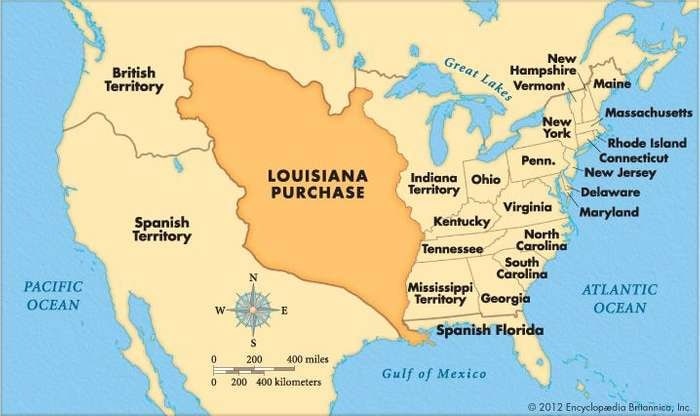Black History Month 2025
1800 1801-1809 1810
2 John Adams | 3 Thomas Jefferson | 4 James Madison
African Slavery Cotton Slavery
Louisiana Purchase Agreement Signed

Paris, France - This agreement transferred all claims of Napoleon and the French government, for the Louisiana Territory, to the United States.
Napoleon lacked the force to hold the area. The United States wanted it to expand slavery. Napoleon tried one last time to stay in the Americas. He sent armies to Louisiana and Haiti.
The army sent to Haiti was defeated. So, Napoleon re-routed the Louisiana army to Haiti. It failed, too.
The United States sent a delegation to Paris, France. They were to make an offer for the Louisiana Territory. The delegation was surprised when the French offered it to them, first.
A deal was quickly arranged. The deal was signed and the document arrived in Washington, D. C. (July 14th, 1803).
From that deal, the Mississippi Valley area was opened to the United States. This territory doubled the size of the United States. It opened a vast new area to enslave Black Americans.
The agreement never recognized the claims of non-whites that already lived in the area (tribal peoples). It greatly expanded the internal slave trade.
Share:
Haiti Founded

Port-au-Prince, Haiti - The nation of Haiti began on this date. It was the only nation born from a successful slave revolt.
Haiti was the first independent nation of Latin America and the Caribbean. It was the second republic in the Americas. It was the first nation to abolish slavery.
The Haitian Revolution took more than 12 years. 3 colonial armies were defeated (2 French and 1 British). (22 August 1791-January 1, 1804), in the fight.
This revolution led France to sell the Louisiana Territory, to the United States (1803). In Europe, it launched the Napoleonic Wars (1803-1815).
Share:
United States Banned African Slaves

Washington, D. C. - Thomas Jefferson signed the Act Prohibiting Importation of Slaves. It went into effect, January 1st, 1808.
This did not abolish slavery. It did not emancipate the enslaved. It only made the entry of enslaved people, into the United States, illegal.
Share:
Slave Trade Act 1807

London, England - The Parliament of the United Kingdom passed An Act for the Abolition of the Slave Trade. This Act ended the Transatlantic Slave Trade, by law, in the United Kingdom.
Great Britain stopped slavery, in 1772, in the country. It was due to a ruling from Somerset's Case, of that year. It was ruled that slavery had no place on English soil. This had no effect on slavery in the British colonies. The law that barred it in the colonies came later, in 1833.
After the United States formed, the African slave trade became less profitable for Britain. Its slave sugar colonies in the Caribbean needed lots of support. Sugar competition, from Spanish Cuba and Portuguese Brazil hurt. Add to that, Britain needed its navy for its India colonies.
British-made sugar was a costly effort. Instead, Britain found that trade, with Portugal and Spain, for their sugar was better. British finished goods were sent to pay for the sugar. This led to more profit for Britain. At the same time, Napoleon saw how it helped Britain. He wanted it stopped. Britain also controlled sugar refining. Napoleon wanted that too.
The demands on the navy, by Britain, were many. There were the Napoleonic Wars (1803-1815). Britain wanted to protect its India project. The navy, of Britain, had to secure trade routes with Cuban and Brazilian slave colonies. African slave trading was more trouble than it was worth by 1807. So, it was stopped, by law.
Share:
